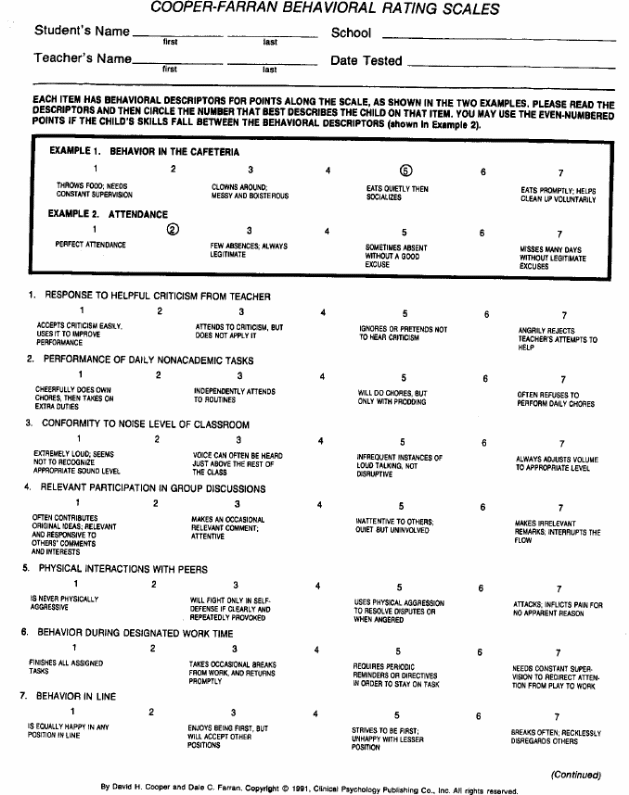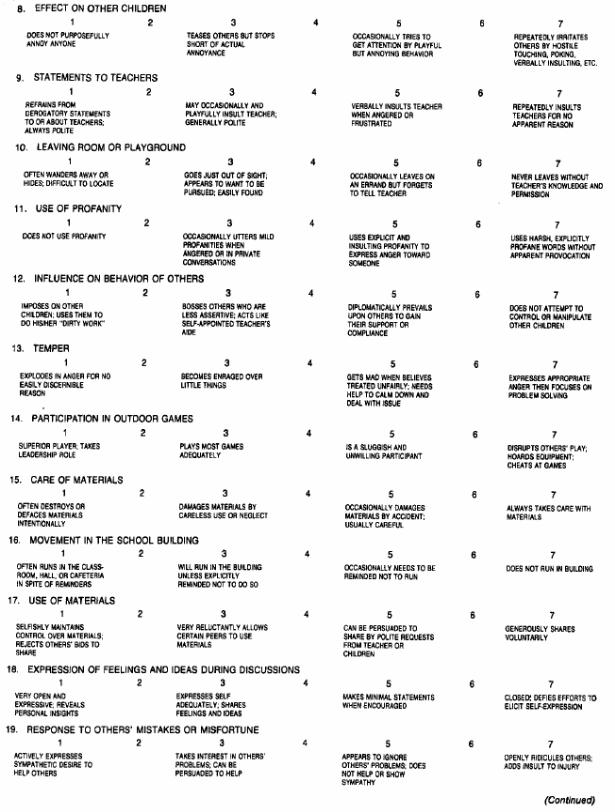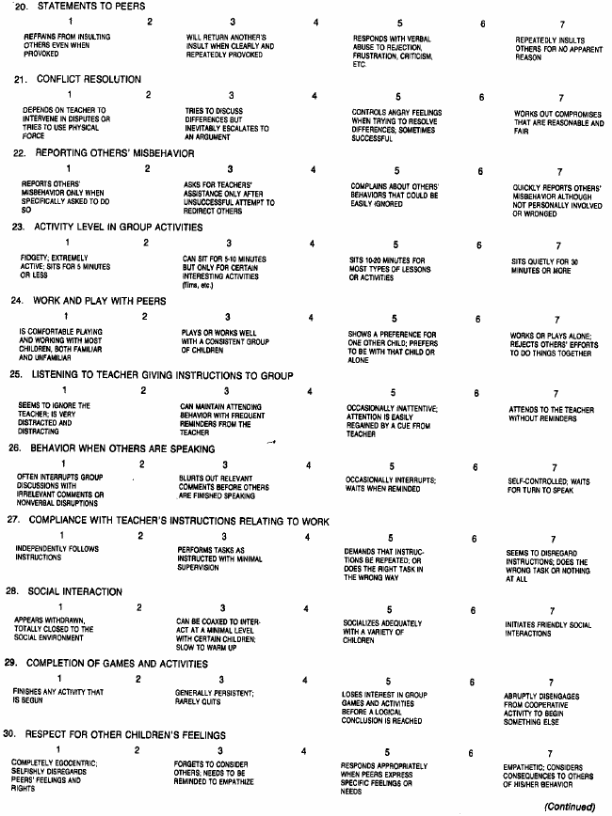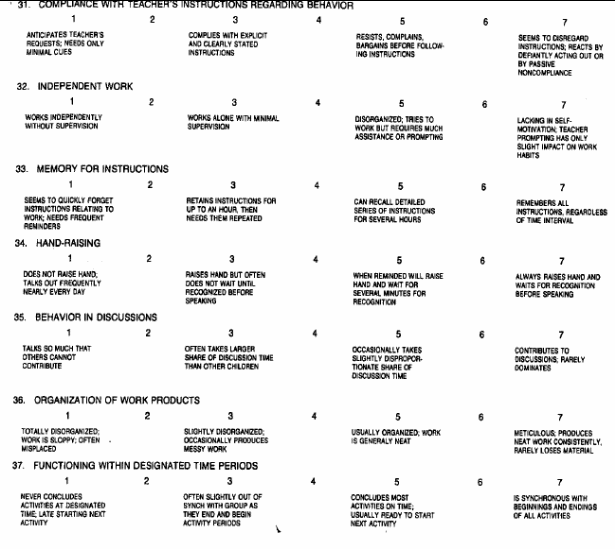Instrument 10: Baseline teacher reports to questions about children in classroom
OPRE Study: Variations in Implementation of Quality Interventions (VIQI) [Pilot, Impact, Process Studies]
Instrument 10_CLEAN Baseline Teacher Reports to Questions about Children
Instrument 10: Baseline teacher reports to questions about children in classroom
OMB: 0970-0508
V IQI
Baseline Teacher Report on Children
IQI
Baseline Teacher Report on Children
April 2021

BASELINE TEACHER REPORTS TO QUESTIONS ABOUT CHILDREN IN CLASSROOM
The purpose of the Baseline Teacher Report on Children is to capture children’s social and behavioral outcomes (i.e., positive social behaviors, challenging behaviors, and approaches to learning) based on teacher observation and interaction during routine classroom activities at the beginning (baseline) of the impact evaluation and process study. Lead teachers will be asked to complete a report on selected children in their classroom. This will be handed out at about the same time as the baseline teacher survey.
Introduction
Thank you for participating in the Variations in Implementation of Quality Interventions (VIQI) Project! As part of this study, we would like you to answer some questions about some children in your classroom. This information is crucial to helping us understand the impacts of early care and education centers on children.
Your participation is completely voluntary, and you may skip any questions you do not wish to answer. You may stop the survey at any time. Your responses to these questions will be kept private to the extent permitted by law and will not be shared with your supervisor or other staff. There are no direct benefits to you for participating. Participation does not involve any risks other than what you would encounter in daily life. There is a small risk that your information could be lost, stolen, or misused, even though we follow strict rules to protect your information. The study team will follow strict procedures to protect your responses, and your responses will only be used for research and program improvement purposes. Your responses will be stored in password protected computer files and in locked research facilities. The data will be used only by the research team and other researchers bound by the same security requirements described here. We also may share de-identified responses with researchers looking at other education research topics who agree that they will protect your information.
Please complete this questionnaire within the next [X] days. Once complete, please send it back to [ADDRESS]. It will take approximately 10 minutes per child to complete. If you have any questions, please contact your project liaison at [PHONE] or [email].
Thank you!
An agency may not conduct or sponsor, and a person is not required to respond to, a collection of information unless it displays a currently valid OMB control number. The OMB number for this information collection is 0970-0508 and the expiration date is XX/XX/XXXX. Send comments regarding this burden estimate or any other aspect of this collection of information, including suggestions for reducing this burden to [Contractor Contact Name]; [Contractor Contact Address].
NOTE: THE ITEMS LISTED HERE ARE PLACEHOLDERS. MANY OF THESE ITEMS ARE DRAWN FROM SURVEYS OF EARLY CHILDHOOD TEACHERS PREVIOUSLY USED IN STUDIES OF CURRICULUM-BASED INTERVENTIONS. THE SURVEY INCLUDES MULTIPLE ITEMS AND SCALES FOR CERTAIN CONSTRUCTS. ONCE PROJECT EXPERTS ARE CONSULTED AND PRE-TESTING IS COMPLETED, DECISIONS WILL BE AND SCALES WILL BE ADJUSTED.
PLACEHOLDERS FOR ITEMS ABOUT CHILDREN’S POSITIVE SOCIAL SKILLS
How well do you know [child name]?
Not well
Moderately well
Very well
I have known [child name] for _____ months.
Instructions: Please rate [child name] on each of the following items. Ratings should be based on your observations of this child’s behavior during the past 3 months. The rating points after each item appear in the following format:
Never: If the child does not exhibit a specified behavior, or if you have not had an opportunity to observe it, select 0, which indicates Never.
Rarely: If the child exhibits a specified behavior or characteristic, but only very infrequently, select 1, which indicates Rarely.
Sometimes: If the child occasionally exhibits a specified behavior or characteristic, select 2, which indicates Sometimes.
Often: If the child frequently exhibits a specified behavior or characteristic, select 3, which indicates Often.
Social Skills Scale (Preschool and Kindergarten Behavior Scales – Second Edition) |
Never |
Rarely |
Sometimes |
Often |
|
0 |
1 |
2 |
3 |
|
0 |
1 |
2 |
3 |
|
0 |
1 |
2 |
3 |
|
0 |
1 |
2 |
3 |
|
0 |
1 |
2 |
3 |
|
0 |
1 |
2 |
3 |
|
0 |
1 |
2 |
3 |
|
0 |
1 |
2 |
3 |
|
0 |
1 |
2 |
3 |
|
0 |
1 |
2 |
3 |
|
0 |
1 |
2 |
3 |
|
0 |
1 |
2 |
3 |
|
0 |
1 |
2 |
3 |
|
0 |
1 |
2 |
3 |
|
0 |
1 |
2 |
3 |
|
0 |
1 |
2 |
3 |
|
0 |
1 |
2 |
3 |
|
0 |
1 |
2 |
3 |
|
0 |
1 |
2 |
3 |
|
0 |
1 |
2 |
3 |
|
0 |
1 |
2 |
3 |
|
0 |
1 |
2 |
3 |
|
0 |
1 |
2 |
3 |
|
0 |
1 |
2 |
3 |
|
0 |
1 |
2 |
3 |
|
0 |
1 |
2 |
3 |
|
0 |
1 |
2 |
3 |
|
0 |
1 |
2 |
3 |
|
0 |
1 |
2 |
3 |
|
0 |
1 |
2 |
3 |
|
0 |
1 |
2 |
3 |
|
0 |
1 |
2 |
3 |
|
0 |
1 |
2 |
3 |
|
0 |
1 |
2 |
3 |
Please rate each of the listed behaviors according to how well it describes [CHILD NAME].
Prosocial Behavior Subscale from the Social Competence Scale (CPPRG, 1995) |
Almost Never |
Rarely |
Sometimes |
Often |
Very Often |
Almost Always |
Shares with others |
1 |
2 |
3 |
4 |
5 |
6 |
Is helpful to others |
1 |
2 |
3 |
4 |
5 |
6 |
Resolves problems with other children on his or her own |
1 |
2 |
3 |
4 |
5 |
6 |
Listens to other people’s point of view |
1 |
2 |
3 |
4 |
5 |
6 |
Cooperates |
1 |
2 |
3 |
4 |
5 |
6 |
Understands other people’s feelings |
1 |
2 |
3 |
4 |
5 |
6 |
Expresses needs and feelings appropriately |
1 |
2 |
3 |
4 |
5 |
6 |
Emotion Regulation Subscale from the Social Competence Scale (CPPRG, 1995) |
|
|
|
|
|
|
Copes well with disappointment or frustration |
1 |
2 |
3 |
4 |
5 |
6 |
Accepts things not going his or her way |
1 |
2 |
3 |
4 |
5 |
6 |
Feelings are easily hurt (R) |
1 |
2 |
3 |
4 |
5 |
6 |
Whines or complains (R) |
1 |
2 |
3 |
4 |
5 |
6 |
Controls temper when there is a disagreement |
1 |
2 |
3 |
4 |
5 |
6 |
Stops and calms down when frustrated or upset |
1 |
2 |
3 |
4 |
5 |
6 |
PLACEHOLDERS FOR ITEMS ABOUT CHILDREN’S CHALLENGING BEHAVIORS
Please rate [child name] on each of the following items. Ratings should be based on your observations of this child’s behavior during the past 3 months. The rating points after each item appear in the following format:
Never: If the child does not exhibit a specified behavior, or if you have not had an opportunity to observe it, select 0, which indicates Never.
Rarely: If the child exhibits a specified behavior or characteristic, but only very infrequently, select 1, which indicates Rarely.
Sometimes: If the child occasionally exhibits a specified behavior or characteristic, select 2, which indicates Sometimes.
Often: If the child frequently exhibits a specified behavior or characteristic, select 3, which indicates Often.
Problem Behavior Scale (Preschool and Kindergarten Behavior Scales – Second Edition) |
Never |
Rarely |
Sometimes |
Often |
|
0 |
1 |
2 |
3 |
|
0 |
1 |
2 |
3 |
|
0 |
1 |
2 |
3 |
|
0 |
1 |
2 |
3 |
|
0 |
1 |
2 |
3 |
|
0 |
1 |
2 |
3 |
|
0 |
1 |
2 |
3 |
|
0 |
1 |
2 |
3 |
|
0 |
1 |
2 |
3 |
|
0 |
1 |
2 |
3 |
|
0 |
1 |
2 |
3 |
|
0 |
1 |
2 |
3 |
|
0 |
1 |
2 |
3 |
|
0 |
1 |
2 |
3 |
|
0 |
1 |
2 |
3 |
|
0 |
1 |
2 |
3 |
|
0 |
1 |
2 |
3 |
|
0 |
1 |
2 |
3 |
|
0 |
1 |
2 |
3 |
|
0 |
1 |
2 |
3 |
|
0 |
1 |
2 |
3 |
|
0 |
1 |
2 |
3 |
|
0 |
1 |
2 |
3 |
|
0 |
1 |
2 |
3 |
|
0 |
1 |
2 |
3 |
|
0 |
1 |
2 |
3 |
|
0 |
1 |
2 |
3 |
|
0 |
1 |
2 |
3 |
|
0 |
1 |
2 |
3 |
|
0 |
1 |
2 |
3 |
|
0 |
1 |
2 |
3 |
|
0 |
1 |
2 |
3 |
|
0 |
1 |
2 |
3 |
|
0 |
1 |
2 |
3 |
|
0 |
1 |
2 |
3 |
|
0 |
1 |
2 |
3 |
|
0 |
1 |
2 |
3 |
|
0 |
1 |
2 |
3 |
|
0 |
1 |
2 |
3 |
|
0 |
1 |
2 |
3 |
|
0 |
1 |
2 |
3 |
|
0 |
1 |
2 |
3 |
Please rate the frequency that [child name] shows each behavior.
Aggressive/Oppositional Items from the Teacher Observation of Child Adaptation-Revised (TOCA-R) (Werthamer-Larsson, Kellam, & Wheeler, 1991) |
Almost Never |
Rarely |
Sometimes |
Often |
Very Often |
Almost Always |
Breaks things on purpose |
1 |
2 |
3 |
4 |
5 |
6 |
Stubborn |
1 |
2 |
3 |
4 |
5 |
6 |
Yells at others |
1 |
2 |
3 |
4 |
5 |
6 |
Knowingly breaks rules |
1 |
2 |
3 |
4 |
5 |
6 |
Fights with other children |
1 |
2 |
3 |
4 |
5 |
6 |
Ignores or refuses to obey adults |
1 |
2 |
3 |
4 |
5 |
6 |
Hits, pushes or shoves |
1 |
2 |
3 |
4 |
5 |
6 |
Internalizing/Withdrawn Items (from TOCA-R and other behavior problem scales developed for young children) |
|
|
|
|
|
|
Invites others to play (R) |
1 |
2 |
3 |
4 |
5 |
6 |
Low energy, lethargic or inactive |
1 |
2 |
3 |
4 |
5 |
6 |
Keeps to him or herself, tends to withdraw |
1 |
2 |
3 |
4 |
5 |
6 |
Sad, unhappy |
1 |
2 |
3 |
4 |
5 |
6 |
Avoids playing with other children |
1 |
2 |
3 |
4 |
5 |
6 |
PLACEHOLDERS FOR ITEMS ABOUT CHILDREN’S APPROACHES TO LEARNING/ENGAGEMENT
Please report on whether each behavior describes [child name] not at all, a little, moderately well, well, or very well. Please select the most appropriate response to each question.
|
Not at all |
A little |
Moderately well |
Well |
Very well |
|
1 |
2 |
3 |
4 |
5 |
|
1 |
2 |
3 |
4 |
5 |
|
1 |
2 |
3 |
4 |
5 |
|
1 |
2 |
3 |
4 |
5 |
|
1 |
2 |
3 |
4 |
5 |
Approaches to Learning (Bierman et al., 2008) – 9 items similar to those used by Birrell et al. (1985). Example items include being able to sit at a table and do work, being ready for the cognitive demands of school, able to work independently. Items rated on a 6-point scale ranging from strongly disagree to strongly agree.
For each statement, please rate how much you agree or disagree.
Approaches to Learning (REDI Project, Bierman et al., 2008) |
Strongly Disagree |
Disagree |
Slightly Disagree |
Slightly Agree |
Agree |
Strongly Agree |
This child well be successful in meeting the demands of school |
1 |
2 |
3 |
4 |
5 |
6 |
This child is ready for the cognitive demands of school |
1 |
2 |
3 |
4 |
5 |
6 |
This child is careful with his or her work |
1 |
2 |
3 |
4 |
5 |
6 |
This child can work independently |
1 |
2 |
3 |
4 |
5 |
6 |
This child is able to sit at a table and do work |
1 |
2 |
3 |
4 |
5 |
6 |
This child is able and willing to follow teacher instructions |
1 |
2 |
3 |
4 |
5 |
6 |
This child seems enthusiastic about learning new things |
1 |
2 |
3 |
4 |
5 |
6 |
This child has the self-control necessary to do well in school |
1 |
2 |
3 |
4 |
5 |
6 |
This child can follow the rules and routines that are part of the school day. |
1 |
2 |
3 |
4 |
5 |
6 |
Approaches to Learning (items from ECLS-K)
The teacher indicates how frequently the child exhibited the following behaviors or characteristics. The response scale included four points ranging from “1 = never” to “4 = very often,” and there was also a “-7 = no opportunity to observe” option.
Keeps belongings organized.
Shows eagerness to learn new things.
Works independently.
Easily adapts to changes in routine.
Persists in completing tasks.
Pays attention well
Classroom Engagement (Fitzpatrick & Pagani, 2013; Pagani et al., 2010)
Response scale is 1 (never) to 3 (always)
Works neatly and carefully
Follows rules and instructions
Follows directions
Listen attentively
Completes work on time
Works autonomously
Works and plays cooperatively with other children
Child Engagement (adaptation from Lee & Reeve, 2012)
Response scale is 1 (strongly disagree) to 7 (strongly agree)
Extent to which this child is often highly engaged -- meaning they show relatively high on-task attention and concentration. This can include showing active listening during activities and tasks, sharing of ideas and responding to questions as the activity or task calls for it, and putting in high effort and high persistence, especially on difficult tasks.
In the following content areas:
Literacy
Math
Science
Social-emotional learning
In the following activities:
Whole group
Small group
Read aloud
Centers
Cooper-Farran Behavior Rating Scales is composed of 37 items in two subscales. The Interpersonal Skills subscale (IPS) includes 21 items and the Work-Related Skills (WRS) subscale includes 16 items. The IPS subscale measures how well children get along with peers and the teacher. The WRS subscale includes items about independent work, compliance with instructions, and memory for instructions. Items are rated on a 1-7 scale with descriptive phrases to “anchor” points 1,3,5, and 7.




Behavior Rating Inventory of Executive Functioning-Preschool (BRIEF-P; Gioia, Espy, & Isquith, 2002) is a 63-item parent/ teacher completed rating scale for children aged from 2 to 5 years with items composing five executive domains: Inhibit (16 items), Shift (10 items), Emotional Control (10 items), Working Memory (17 items), and Plan/ Organize (10 items). The scales are summarized in three overlapping indexes: Inhibitory Self-Control (Inhibit and Emotional Control), Flexibility (Shift and Emotional Control), and Emergent Metacognition (Working Memory and Plan/Organize). Teachers are asked to rate each item as to whether it is never, sometimes, or often a problem for the child (e.g., “Is impulsive”).
BRIEF-P (63 items) – Parent and Teacher Reported Versions |
Never |
Sometimes |
Often |
|
1 |
2 |
3 |
|
1 |
2 |
3 |
|
1 |
2 |
3 |
|
1 |
2 |
3 |
|
1 |
2 |
3 |
|
1 |
2 |
3 |
|
1 |
2 |
3 |
|
1 |
2 |
3 |
|
1 |
2 |
3 |
|
1 |
2 |
3 |
|
1 |
2 |
3 |
|
1 |
2 |
3 |
|
1 |
2 |
3 |
|
1 |
2 |
3 |
|
1 |
2 |
3 |
|
1 |
2 |
3 |
|
1 |
2 |
3 |
|
1 |
2 |
3 |
|
1 |
2 |
3 |
|
1 |
2 |
3 |
|
1 |
2 |
3 |
|
1 |
2 |
3 |
|
1 |
2 |
3 |
|
1 |
2 |
3 |
|
1 |
2 |
3 |
|
1 |
2 |
3 |
|
1 |
2 |
3 |
|
1 |
2 |
3 |
|
1 |
2 |
3 |
|
1 |
2 |
3 |
|
1 |
2 |
3 |
|
1 |
2 |
3 |
|
1 |
2 |
3 |
|
1 |
2 |
3 |
|
1 |
2 |
3 |
|
1 |
2 |
3 |
|
1 |
2 |
3 |
|
1 |
2 |
3 |
|
1 |
2 |
3 |
|
1 |
2 |
3 |
|
1 |
2 |
3 |
|
1 |
2 |
3 |
|
1 |
2 |
3 |
|
1 |
2 |
3 |
|
1 |
2 |
3 |
|
1 |
2 |
3 |
|
1 |
2 |
3 |
|
1 |
2 |
3 |
|
1 |
2 |
3 |
|
1 |
2 |
3 |
|
1 |
2 |
3 |
|
1 |
2 |
3 |
|
1 |
2 |
3 |
|
1 |
2 |
3 |
|
1 |
2 |
3 |
|
1 |
2 |
3 |
|
1 |
2 |
3 |
|
1 |
2 |
3 |
|
1 |
2 |
3 |
|
1 |
2 |
3 |
|
1 |
2 |
3 |
|
1 |
2 |
3 |
|
1 |
2 |
3 |
| File Type | application/vnd.openxmlformats-officedocument.wordprocessingml.document |
| Author | Michelle Maier |
| File Modified | 0000-00-00 |
| File Created | 2021-04-30 |
© 2026 OMB.report | Privacy Policy